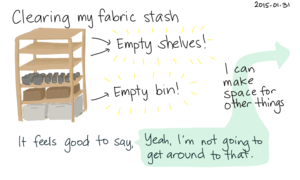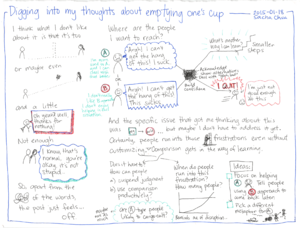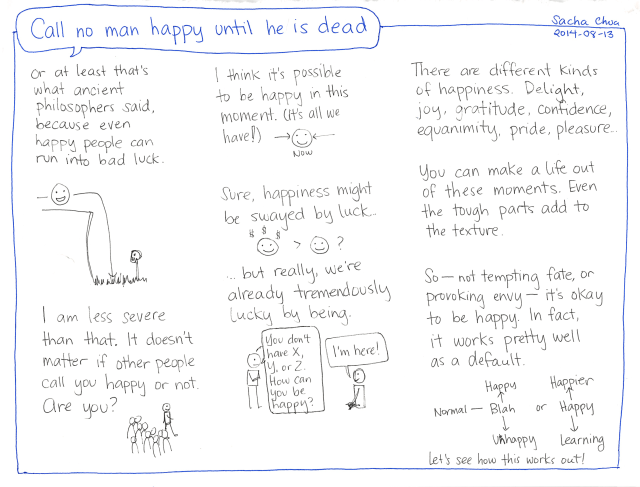Cultivate memories deliberately
Posted: - Modified: | lifeHow much can we influence the memories that come upon us unexpectedly or the ones that we bring up when we reflect?
Sometimes, in the middle of washing the dishes, I remember standing on a footstool in my mother's kitchen and washing the dishes there; she'd taught the three of us sisters to handle different stages of the dish-washing assembly line. I can see what prompted that memory. The connection is easy to understand. Other times, I'm not sure what drew me back to a time or place I'd forgotten. Some memories make me smile. Others remind me where I could've done better.
I've been thinking about long-term happiness, experiences, and memory. I imagine that at eighty or ninety years old, you'd want to have plenty of good memories. What's worth paying attention to? What's worth creating experiences for? How can you smooth the edges of rough memories and intensify good ones?
Here are some of my thoughts about the memories I want to cultivate through attention and understanding.
I'd like to remember, clearly and distinctly, the things that contribute to happiness: connection, mastery, triumph, little moments of joy. How can we get better at things like that? Paying close attention, and creating the situations where these memories can arise.
I'd like to remember the storms – not to dwell on them, not to feel a victim, but to remember that they're temporary and that we've weathered them in the past. (No Eternal Sunshine of the Spotless Mind for me!) I don't write as much about these (in public, or even in my journals), but that doesn't mean I don't think of them from time to time. By not writing about them, though, I miss out on the opportunity to make sense of them, to fit them into a coherent narrative that helps me move forward.
I'd like to remember the things that will help me make better decisions: ideas, assumptions, consequences, lessons learned. Since it can be hard to remember details and one's mind is often tempted to rewrite things more favourably, writing about these things is a good way to extend my understanding over time.
I have a lot of mental clutter. The time in school I wanted to experiment with fixing a memory with intense clarity, choosing (of all things!) the speckled ceiling to focus on. Many embarrassing moments, like the time a friend teased me for having mispronounced "adolescent" in a moment of inattention. Every moment contains a lesson, but I'm not sure that these lessons are worth the attention my mind gives them. I don't dwell on these thoughts, but they skitter across my brain from time to time. It would be good to be able to acknowledge them and their underlying thoughts, and then put them on a mental shelf. Then, when they escape, I can say, "Oh, hello again! Do you have anything to add? No? Back you go."
By thinking about memories on my own terms, I can make sense of them my way. The narratives we tell ourselves have such power. If your story is "Everyone's against me!", it's easy to find memories that fit that pattern, and you'll feel worse and worse. If your story is "Actually, things are pretty awesome," it will likewise be easy to find memories that fit. By thinking about the general types of memories that come up and connecting them to a positive story, it'll be easier to respond to them positively when they come up at other times.
In addition to cultivating your existing memories, it's also good to deliberately create good ones. The impression I get from how other people do this is that people plan Big Memories. The awesome vacation. The ascetic pilgrimage. The conquered marathon.
My life tends to be about small memories. The in-joke picked up from the movie W- and I watched a few years ago, blended with the pun of the moment. The amusing situations our cats get themselves into. Cooking with friends. There are big memories mixed in there too (family trips, graduations, weddings), but the small ones… How can I explain this? The small ones seem as richly flavoured as the big ones are. Big memories are easier to tell other people about, but the small ones are more plentiful.
(Unless you're like my dad, generating big memories by the bucket-load because you're always on interesting adventures.)
What would it be like to be a big-memory-full person, a bucket-list-crosser-outer, a grand adventurer? Maybe I'd go refresh my memory of a night sky so clear you feel the dimensions of space. Maybe I'd splurge on eating interesting food at wonderful restaurants. Maybe I'd go to more parties (some of my friends throw themed ones, even). Maybe I'd bike around more in the city, or take the train and try biking near Niagara. Maybe I'd get back into the habit of having birthday parties.
In "Memories Make Your Life Meaningful – Here's How to Have More of Them, Ben Casnocha writes:
- Prize novelty. Novelty leads to memories.
- Take on challenges; endure struggle; feel intense lows and highs.
- Do things with people. And use people as a key variable.
- Seek novelty, yes, except when novelty itself becomes routine.
- Review and re-live memories soon after the fact.
- If you consciously focus on creating a great memory in the moment, it sticks.
More novelty, more randomness, more challenges, more people, more review, more attention. This slows life down, makes it denser with memories, and expands joy.
Cultivate memories more deliberately: make sense of your existing memories, and consciously build new ones. What would you like to remember in twenty years?



